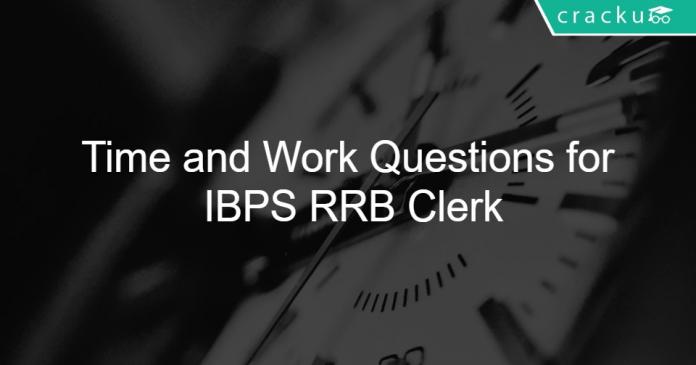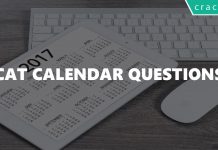Time and Work Questions for IBPS RRB Clerk:
Download Top-20 IBPS RRB Clerk Data Interpretation Questions PDF. Data Interpretation questions based on asked questions in previous year exam papers very important for the IBPS RRB Assistant exam
Download Time and Work Questions for IBPS RRB Clerk
35 IBPS RRB Clerk Mocks @ Rs. 149
70 IBPS RRB (PO + Clerk) Mocks @ Rs. 199
Take a free mock test for IBPS RRB Clerk
Download IBPS RRB Clerk Previous Papers PDF
Question 1: The speed of a boat in still water is 12 kmph. If the speed of the stream is 4kmph. Find the time taken by boat to travel 480 km upstream.
a) 52 hr
b) 60 hr
c) 45 hr
d) 46 hr
e) 42 hr
Question 2: A motor boat travels at a speed of 35 km/hr in still water. How much time will it take to travel 40km upstream and 10 km downstream if the speed of water current is 5 km/hr?
a) 1.33 hours
b) 1.66 hours
c) 1.58 hours
d) 1.4 hours
e) None of these
Question 3: By driving at 40 km/hr, Ajay reaches his office 10 minutes late. If he drives at 50 km/hr, he reaches his office 2 minutes early. At what speed (in km/hr) should he drive, so that he reaches his office just in time?
a) 43.33
b) 46.67
c) 48
d) 47.33
e) none of these
Question 4: Amar starts from P to Q in his bike at 70 km/hr and Roshan starts from Q to P at 50 km/hr. If the distance between P and Q is 120km, what is the time required by Rohan to reach P after meeting Amar?
a) 1 hr 40 minutes
b) 1 hr 24 minutes
c) 50 minutes
d) 1 hr 12 minutes
e) 1 hr
Question 5: If the speed of a train is reduced by 20 percent, the time taken to cover a given distance increases by 2 hours, what is the usual time taken to cover the given distance?
a) 10 hours
b) 16 hours
c) 8 hours
d) 12 hours
e) 18 hours
Question 6: A and B are points on the circumference of a park such that AB is the diameter. The diameter is 210 m. P and Q, who are standing at points A and B, start running in opposite directions at a constant speed of 15 m/s. After how much time will they meet each other?
a) 7 s
b) 9 s
c) 10 s
d) 11 s
e) 12 s
Question 7: A tap can fill a tank in 6 hours. Because of a leakage, it filled the tank in 8 hours. How much time the leakage takes to empty a full tank?
a) 21 hours
b) 12 hours
c) 24 hours
d) 20 hours
e) 18 hours
Question 8: A train of length 100m crosses a pole in 20 seconds. In how much time will it cross another train of length 200m which is travelling in the opposite direction with a speed double of it?
a) 13.33 sec
b) 15 sec
c) 20sec
d) 30 sec
e) 25 sec
Question 9: A boat takes 4 hrs and 6hrs to travel certain distance upstream and downstream respectively. How much time it takes to travel five times the distance in still water?
a) 24 hours
b) 16 hours
c) 18 hours
d) 22 hours
e) None of these
Question 10: Two trains A and B of equal lengths cross a pole in 60 seconds and 72 seconds respectively, how much time they take to cross each other if they are moving in opposite directions (in seconds)?
a) 64.32
b) 67.5
c) 68.34
d) 65.45
e) 62.3
Free Mock Test for IBPS RRB PO
IBPS RRB Clerk Previous Papers
Question 11: Amith starts running at a speed of 8km/hr and for every half-n-hour his speed decreases by 1km/hr. How much time amith takes to cover a distance of 16 km(in hours)?
a) $2$
b) $2\frac{1}{6}$
c) $3$
d) $2\frac{4}{6}$
e) $2\frac{5}{6}$
Question 12: A 250 m long train crosses a pole in 10 seconds. Find the time that the train will take to completely cross a platform of length 200 metres.(The train continues to run at the same speed)
a) 15 seconds
b) 18 seconds
c) 20 seconds
d) 25 seconds
e) cannot be determined
Question 13: The speed of a boat in still water is 10 km/hr and the speed of the stream is 3 km/hr. How much time will the boat take to go a distance of 63 km upstream?
a) 7 hours
b) 8 hours
c) 9 hours
d) 10 hours
e) 11 hours
Question 14: The speed of a boat in still water is 5 km/hr. The speed of the stream is 3 km/hr. The boat has to travel to a point 24 km far and has to come back to the starting point. How much time will the whole trip take?
a) 12 hours
b) 15 hours
c) 16 hours
d) 18 hours
e) 20 hours
Question 15: The speeds of a boat upstream and downstream are 5 km/hr and 15 km/hr. How much time will it take for the boat to go from point A to point B upstream and come back to point A downstream? The distance between the points A and B is 15 km.
a) 1 hour
b) 2 hours
c) 3 hours
d) 4 hours
e) Cannot be determined
Question 16: Two taps A, B can fill the tank together in 8 hours and tap A can fill the same tank in 12 hours. How much time does tap B take to fill the tank?
a) 13
b) 16
c) 24
d) 26
e) None of these
Question 17: A train running at 72 km/hr crosses a pole in 10 seconds. In how much time will it cross a platform of length of 400 m?
a) 15 seconds
b) 20 seconds
c) 25 seconds
d) 30 seconds
e) none of these
Question 18: A train, which is running at 30 m/s, crosses a pillar in 4 seconds. In how much time (in seconds) will it cross another train of same length which is running at a speed double of the first train, but in opposite direction?
a) $2\frac{2}{5}$
b) $3\frac{2}{3}$
c) $2\frac{2}{3}$
d) $3\frac{1}{2}$
e) None of these
Question 19: The speed of a train, excluding stoppages, is 78 kmph. Including stoppages it is 65 km/hr. What is the average stopping time of the train per hour?
a) 5 minutes
b) 6 minutes
c) 8 minutes
d) 10 minutes
e) 12 minutes
Question 20: Two taps A, B can fill a tank together in 6 hours and tap A can fill the same tank in 8 hours. How much time does tap B take to fill the tank?
a) 12
b) 18
c) 28
d) 24
e) None of these
Quantitative Aptitude formulas PDF
Question 21: A man starts at 10 km/hr and for every one hour his speed decreases by 2km/hr. How much time he takes to travel 25 km?
a) 4 hours
b) 240 minutes
c) 3 hr 15 minutes
d) 210 minutes
e) None of these
Question 22: Two taps A, B can fill the tank together in 6 hours, and tap C can empty the tank in 8 hours. If all the taps are kept open, how much time it takes for the tank to get full?
a) 12
b) 18
c) 24
d) 28
e) None of these
Question 23: A train having a length of 250m is travelling at 50 m/s. What is the time taken by the train to cross a bridge having a length of 150m ?
a) 20s
b) 5s
c) 8s
d) 10s
e) none of these
Question 24: Two taps A, B can fill the tank in 8, 6 hours respectively. If both the taps are opened at 12 pm and tap A is closed at 2 pm, at what time the tank will be full (initially empty)?
a) 4:30 pm
b) 4:35 pm
c) 4:40 pm
d) 4:10 pm
e) None of these
Question 25: Prem and Amar start from 2 points, 100 km apart, towards each other at a constant speed of 33km/hr and 17km/hr. After how much time will they meet each other?
a) 2 hours
b) 1.5 hours
c) 4 hours
d) 6.25 hours
e) 5 hours
520 Banking Mocks – Just Rs. 499
Answers & Solutions:
1) Answer (B)
Speed of the boat upstream = 12-4 = 8 kmph
Time taken by boat to travel 480 km = 480/8 = 60 h.
2) Answer (C)
Speed of boat upstream = 35 -5= 30 km/hr
Speed of boat downstream = 35+5= 40 km/hr.
=> Time taken for the whole journey = $\frac{40}{30}+\frac{10}{40} = 1.58$ hours
3) Answer (C)
If his speed becomes 5/4 times of his earlier speed. His time should become 4/5 of his earlier time.
Hence the reduction in time is 1/5.
In this case this 1/5 corresponds to 12 minutes. Hence the time taken to reach the office at the speed of 40 km/hr would be 12*5 = 60 minutes.
Hence the distance would be 40*1 = 40 km.
Ne needs to cover this distance in 50 minutes.
Hence the required speed would be 40*6/5 = 48 km/hr
4) Answer (B)
Since, the speed of Roshan and Amar is in the ratio 7 : 5, the distance covered by them will also be in the ration 7 : 5. Thus, when Roshan meets Amar, he would have travelled 5/12 x 120 = 50km. Thus, he has to cover 70 km more to reach P.
The time required by Amar to travel 70km = distance /speed = 70/50 = 1.4 hrs = 1 hr 24 minutes
5) Answer (C)
The speed is reduced by 20%, so the new speed is 4/5 times the earlier speed.
Hence the new time would 5/4 times the earlier time.
So if the usual time is x, then new time is 5x/4
5x/4 – x = 2
=> x/4 = 2
=> x = 8
Hence the usual time taken to cover the given distance is 8 hours.
6) Answer (D)
Distance to be covered = $\pi*r=\frac{22}{7}*105=330$ m
As both of them are running towards each other, the relative speed will be a sum of their speeds.
Relative speed = 15+15 = 30 m/s
Time needed = 330/30 = 11 s
7) Answer (C)
Let volume of the tank = V.
Efficiency of the tap = V/6
Efficiency of the leakage = a
==> V/8 = V/6 +a ==> a = -1/24 ==> it takes 24 hours to drain the full tank.
8) Answer (C)
Since it crosses a pole in 20 seconds, the speed of train 1 = 100/20 = 5m/sec
=> Speed of train 2 = 10 m/s
Distance to be covered = 100+200=300m
Relative speed = 10+5=15 m/s (As they are travelling in opposite directions)
=> Crossing time = 300/15=20 sec.
9) Answer (A)
Let the distance = x
Speed of boat in still water = V
Speed of the current = c
Based on the given information, the following equations could be derived.
$\frac{x}{v-c}$ = 6 —(1)
$\frac{x}{v+c}$ = 4 —(2)
By solving both the equations, we could derive the following equation.
$V = \frac{5x}{24}$
Time taken by the boat in still water to cover a distance of 5x = 24 hours.
10) Answer (D)
Let the speeds of the trains A and B be a and b respectively.
Let the length of the trains =x
x/a = 60 ==> a = x/60
x/b = 72 ==> b = x/72
==> 2x/(a+b) = $\frac{2x}{\frac{x}{60}+\frac{x}{72}}$ = 65.45 seconds.
11) Answer (E)
Distance travelled in first half-n-hour = 4km.
Distance travelled in second half-n-hour = 3.5km and so on….
==> 4+3.5+3+2.5..n terms = 16
For n=5, the sum of the terms = 15.
And in the next half-n-hour amith’s speed = 3km/hr
Time taken by Amith to cover a distance of 1km = 1/3 hr.
==> Total time taken by Amith to cover a distance of 16 km = $2\frac{1}{2}+\frac{1}{3}$hr = $2\frac{5}{6}$ hr.
12) Answer (B)
The train crosses a pole in 10 seconds, so the speed of the train = 250/10 = 25 m/s
Now when the train goes on to cross the platform, the total distance to be covered is length of train + length of platform. So required time = 450/25 = 18 seconds
13) Answer (C)
The speed of boat in still water, u = 10 km/hr
The speed of the stream, v = 3 km/hr
The relative speed of the boat while moving upstream = u-v = 10-3 = 7 km/hr.
Time taken = 63/7 = 9 hours.
14) Answer (B)
The speed of the boat in still water, u = 5 km/hr.
The speed of the stream, v = 3 km/hr
The speed of the boat while going upstream = 5-3 = 2 km/hr
Time taken for the journey upstream = 24/2 = 12 hours.
The speed of the boat while going downstream = 5+3 = 8 km/hr
Time taken for the journey downstream = 24/8 = 3 hours.
Time taken for the whole trip = 12+3 = 15 hours.
Hence the answer to this question is Option B.
15) Answer (D)
The boat has to travel from point A to point B and then back to point A.
So one half of the journey will be travelled upstream and the other half will be travelled downstream.
The speed of the boat upstream = 5 km/hr
Time taken for the journey upstream = 15/5 = 3 hours.
The speed of the boat downstream = 15 km/hr
Time taken for the journey downstream = 15/15 = 1 hour.
Total time taken for the whole journey = 3+1 = 4 hours.
Hence the answer to this question is Option D.
16) Answer (C)
Let the volume of the tank = V
Let the efficiency of the tap A = V/A
And efficiency of the tap B = V/B
==>(V/A + V/ B)*8 = V
==> (V/A + V/B) = V/8
But V/A = V/12 ==> V/12 + V/B= V/8 ==> V/B = V/8 – V/12 ==> V/B = V/24
Therefore tap B takes 24 hours to fill the tank.
17) Answer (D)
Speed of train = 72 km/hr = 20 m/s
It crosses a pole in 10 seconds. So length of train = 20*10 = 200m
While crossing the platform, total distance to be covered is 400+200 = 600 m
=> Hence required time = 600/20 = 30 seconds
18) Answer (C)
Let the length of the train be l m.
=> l= 4 X 30 m= 120m
The other train is running at double speed, i.e. 60 m/s in the opposite direction.
So, the relative speed = 60+30=90 m/s
Distance to cover is 2l=240m
=> Time taken is 240/90 seconds= 8/3 seconds.
19) Answer (D)
Without stopping the train can travel 78 km in one hour.
But it travels only 65 km in one hour. It means that it stops for the time for which it should have travelled 13 km (78-65).
So the stopping time = (13/78)*60 = 10 minutes per hour.
20) Answer (D)
Let the volume of the tank = V
Let the efficiency of the tap A = V/A
And efficiency of the tap B = V/B
==>(V/A + V/ B)*6 = V
==> (V/A + V/B) = V/6
But V/A = V/8 ==> V/8 + V/B= V/6 ==> V/B = V/6 – V/8 ==> V/B = V/24
Therefore tap B takes 24 hours to fill the tank.
21) Answer (C)
Distance traveled by him in the first hour = 10 km
Distance traveled by him in the second hour = 8 km
Distance traveled by him in the third hour = 6 km
Total distance traveled by him in three hours = 24
Speed during the fourth hour = 4 km/hr
==>Time taken by him to travel 1 km = ¼ hr = 15minutes.
So the correct option to choose is C – 3 hr 15 minutes.
22) Answer (C)
Let the volume of the tank = V
Let the efficiency of the tap A = V/A
And efficiency of the tap B = V/B
==>(V/A + V/ B)*6 = V
==> (V/A + V/B) = V/6
Efficiency of tap C to empty the tank = V/C
==> (V/C)*8 = V ==> (V/C) = (V/8)
==> ($\frac{V}{A} + \frac{V}{B}- \frac{V}{C}$) = (V/6 -V/8)
= V/24
Therefore it takes 24 hours for the tank to get full.
23) Answer (C)
By TSD relation,
speed of train = distance covered by train/time taken = length of train + bridge/t
=> t = 400/50 = 8s
24) Answer (A)
Let the volume of the tank = V
Portion of the tank filled with water at 2 pm = 2(v/6 + v/8) = 7v/12
Time taken by B to fill the remaining portion of the tank = t
==>(v/6)*t = (v – 7v/12) = 5v/12
==>t = (5/2) = 2 $\frac{1}{2}$ hours = 2 hours 30 minutes
==>at (2+2 hours 30 minutes) = 4:30 pm the tank will be full.
25) Answer (A)
Since they are moving towards each other, their relative speed will be the sum of their individual speeds = (33+17)=50km/hr. The distance between them is 100km. Thus, the time taken by them will be-
$\frac{100}{50}hours$= 2 hours.
Thus, the answer is A.





![How To Manage Time In CAT Exam? [Section-wise Tips] How to manage time in CAT exam ?](https://cracku.in/blog/wp-content/uploads/2018/09/fig-03-09-2018_10-54-46-218x150.jpg)